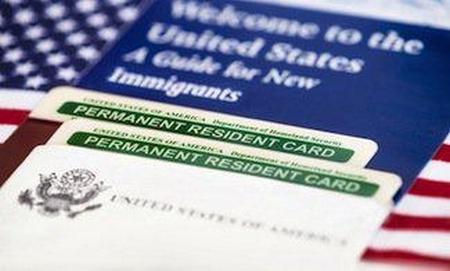Recent Blog Posts
The Rights and Responsibilities of Lawful Permanent Residents
 When a person is granted the status of Lawful Permanent Resident (LPR, or ‘green card holder’), they are gifted with several new rights, but they also come with responsibilities that must be upheld. Many who attain LPR status have no idea of the obligations they now have, and it is important that you understand what is required lest you inadvertently break the law.
When a person is granted the status of Lawful Permanent Resident (LPR, or ‘green card holder’), they are gifted with several new rights, but they also come with responsibilities that must be upheld. Many who attain LPR status have no idea of the obligations they now have, and it is important that you understand what is required lest you inadvertently break the law.
Privileges
The “rights” of LPRs are in reality more appropriately called privileges, because the U.S. government may revoke your LPR status at any time if you fail to fulfill the conditions of having it. Still, the list of advantages that LPRs possess over those on immigrant visas is significant in terms of convenience and security. Some include the right (or privilege) to:
- Live anywhere in the United States, with no restrictions;
Immigration Law: What is an Aggravated Felony?
 Immigration law is a difficult discipline, especially when it comes to removal issues. A term that is heard very often in questions concerning possible deportation is aggravated felony. However, the experts are somewhat divided on what actually constitutes an aggravated felony, and what its ramifications are in terms of immigration benefits. The answer is complex, but not out of reach.
Immigration law is a difficult discipline, especially when it comes to removal issues. A term that is heard very often in questions concerning possible deportation is aggravated felony. However, the experts are somewhat divided on what actually constitutes an aggravated felony, and what its ramifications are in terms of immigration benefits. The answer is complex, but not out of reach.
Definition and History
An aggravated felony is defined in a somewhat slippery fashion in terms of U.S. law. If one tries to search for a specific definition, one finds a list of crimes that fall under the category of aggravated felony, but not a list of criteria that makes the crimes in question aggravated felonies. Even the definition at 8 USC § 1101(a)(43) is simply a list of crimes.
The term ‘aggravated felony’ only appeared in U.S. immigration law in 1988, when modifications were made to the Immigration & Nationality Act (INA). At first, only certain drug crimes and murder were part of the group, but the Illegal Immigration Reform & Immigrant Responsibility Act (IIRIRA) and other legislation added several more over the next decade. As of this writing, the term has significantly expanded beyond its original definition, which is a source of controversy for multiple reasons.
Inadmissible vs. Deportable: Not the Same
When an illegal immigrant has been charged with a crime and is found guilty, he or she may be referred to as being found inadmissible or deportable. However, inadmissibility and deportability are not the same. Each refers to a different legal status, and confusing the two is not advisable. Both must be dealt with differently in terms of arguing against removability.
Definitions
Inadmissibility deals with the rules surrounding those who want to enter the United States, in either an immigrant or non-immigrant capacity. Deportability is the power of United States Citizenship and Immigration Services (USCIS) to keep someone from staying in the United States. There are several different reasons why one may be rendered inadmissible; however, most of the reasons why someone may be rendered deportable have to deal with criminal acts.
U.S. immigration law recognizes two different categories of crime that can affect one’s immigration status. The first is aggravated felonies (AFs), which are defined primarily in 8 USC §1101. AFs are crimes which involve particularly serious offenses against morality, such as murder, sexual assault and kidnapping. However, the difficulty is that some crimes which are not felonies under criminal law are still considered AFs for immigration purposes. Hence, this can lead to significant confusion. Examples include bribery, obstruction of justice, and failing to appear in court (if the underlying offense carries a penalty of more than one year).
The second category of crime is crimes involving moral turpitude (CIMTs), which actually have no specific definition in U.S. law, but involve at least one element that constitutes moral turpitude: fraud, larceny, and/or intent to harm. If someone commits a CIMT within 5 years of admission into the country, or commits two CIMTs within a single ‘scheme’ or enterprise—for example, kidnapping and transporting a minor across state lines are two CIMTs that make up a single endeavor—he or she is eligible to be removed. Crimes of moral turpitude may also be aggravated felonies, and aggravated felonies may be CIMTs, but the two categories do not have to overlap.
Confusing Consequences
Being convicted of an aggravated felony will almost always render someone deportable, meaning that he or she can be expelled from the country. However, not all aggravated felonies will render someone inadmissible. Because the rules regarding CIMTs and AFs are somewhat convoluted, it is possible for a crime to render someone both inadmissible and deportable. It may simply confer inadmissibility or deportability, but it is possible to be judged both.
Also, there are several exceptions to both sets of rules. For example, a ‘petty offense exception’ exists which can render a CIMT conviction not usable for deportation purposes. This comes from immigration case law, notably Matter of Mendoza, decided in 1965, and it states that a conviction for one CIMT may be set aside if certain requirements are met. They are:
With Marriage Equality Now the Law of the Land, What Could Happen to Civil Unions and Domestic Partnerships?
 The Supreme Court deciding in favor of same-sex marriage has been an incredible victory for those who have been denied equal protection of fundamental rights. Having the right to marry expanded to all persons interested, regardless of their sexual orientation, has many contemplating the possible repercussions that may affect persons who entered into civil unions and domestic partnerships because marriage was not available to them. Because civil unions and domestic partnerships were honored by states where same-sex marriages were not permitted and by corporations who wanted to extend benefits to domestic partners of their employees, the future of domestic partnerships and the benefits that were provided to domestic partners is being decided.
The Supreme Court deciding in favor of same-sex marriage has been an incredible victory for those who have been denied equal protection of fundamental rights. Having the right to marry expanded to all persons interested, regardless of their sexual orientation, has many contemplating the possible repercussions that may affect persons who entered into civil unions and domestic partnerships because marriage was not available to them. Because civil unions and domestic partnerships were honored by states where same-sex marriages were not permitted and by corporations who wanted to extend benefits to domestic partners of their employees, the future of domestic partnerships and the benefits that were provided to domestic partners is being decided.
Domestic Partnerships/Civil Union Law in Illinois
What is Cancellation of Removal?
When you or a loved one is involved in deportation proceedings, you may be ready and willing to try any possible avenue to keep your loved one in the country. Cancellation of removal—a last-ditch option that many apply for simply as a proverbial Hail Mary—may actually be the best possible fit for some cases.
History and Definition
Cancellation of removal is defined by United States Citizenship and Immigration Services (USCIS) as an immigration benefit that can be granted by an immigration judge, and adjusts one’s status from deportable to that of a permanent resident alien. Still, it may only be granted to one who is in deportation proceedings, and more than a bit of the final determination is based on a judge’s discretion.
Cancellation of removal has only existed in its current form since April 1997, when the Illegal Immigration Reform and Immigration Responsibility Act (IIRIRA) was passed. Before that date, a similar procedure— suspension of deportation—existed. However, suspension of deportation did not differentiate between documented and undocumented immigrants, and the standard one had to meet was markedly lower.
LPR vs. Non-LPR
Cancellation of removal is available, at least in theory, to any individual who is in deportation proceedings, but there are different criteria set out for lawful permanent residents (LPRs, or “green card” holders) and everyone else to meet. The rationale is that LPRs have already had to prove various factors, such as their good moral character, when applying for that status. So, unless something has fundamentally changed, there is no need to require proof of it a second time.
The criteria that must be met for LPRs to have a chance at cancellation of removal are set out in the Immigration and Nationality Act (INA), §240(A). There are only three: (1) an alien has been an LPR for no less than 5 years; (2) he or she has resided in the U.S. continuously for at least seven years in any status; and (3) he or she has not been convicted of an aggravated felony, which is a crime held to have specific immigration weight due to its involving deception or exceptional violence.
The criteria, by comparison, for non-LPRs is somewhat more involved:
Same-Sex Parents: The Residual Roadblocks in “Equality” States
 With the U.S. Supreme Court making decisions regarding the matter of same-sex marriage, soon states might have to start passing legislation that would imbue same-sex couples with the rights afforded to married couples already acknowledged by the United States. There will, however, be a considerable lag between the possible passing of U.S. Supreme Court’s holding and potential corresponding legislation. During that time period, however, same-sex adoption issues and parenthood issues will still be on the dockets until the corresponding legislation has been passed.
With the U.S. Supreme Court making decisions regarding the matter of same-sex marriage, soon states might have to start passing legislation that would imbue same-sex couples with the rights afforded to married couples already acknowledged by the United States. There will, however, be a considerable lag between the possible passing of U.S. Supreme Court’s holding and potential corresponding legislation. During that time period, however, same-sex adoption issues and parenthood issues will still be on the dockets until the corresponding legislation has been passed.
Same-Sex Adoption Rights in Illinois
Luckily for same-sex couples in Illinois, which is one of the most progressive LGBTQ states in the nation, they will not be dealing with the same discrimination that is rampant in other states. The Illinois Department of Children and Family Services permit that all families that are able and willing to care for children are allowed to adopt without any prohibition against same-sex individuals or partners. However, this does not mean that discrimination against same-sex individuals or couples in other states does not have an impact on those lucky enough to live in Illinois.
The Violence against Women Act and Immigration
Many foreign citizens living in the U.S. feel trapped in abusive marriages because of their immigration status yet are unaware of the options they might have to separate themselves from their abuser, or even where to begin to look. There is hope, however; United States Citizenship and Immigration Services (USCIS) has a category of visa which permits some of these individuals to escape their abusers and remain in the country. The Violence Against Women Act (VAWA) is a piece of legislation that has made it easier for battered spouses to obtain legal status without being attached to their abusive mate.
The Origins of VAWA
The Violence Against Women Act was passed in 1994 as a response to an increase in crimes against women. It guarantees certain safeguards for crime victims, and has been extended so that men can take advantage of its protections in certain circumstances. In the same year, provisions in VAWA modified the Immigration and Nationality Act (INA) so that battered spouses (who are victims of domestic violence, which is a crime) could enjoy greater protection from their abusers. While VAWA is used most often by spouses, the provisions in the INA actually apply to spouses, children and parents of U.S. citizens or permanent residents. Not every abusive relationship is romantic, after all; other family members touched by abuse deserve equal protections.
One situation that may occur is when a U.S. citizen or permanent resident files an I-130, Petition for Alien Relative, for their spouse, parent or child, and then hold that over the person’s head. The battered person comes to think that he or she has no alternative but to remain with the abuser, because they fear the consequences of deportation. He or she may have entered the country without inspection, and thus would face very real hardships if sent back to their homeland. However, in truth, VAWA does not consider the status of a battered person in their application, at least not in theory.
How to Apply
The only requirements are that (1) a person be the spouse, parent or child of a U.S. citizen or permanent resident; (2) he or she be the victim of abuse or battering from that person, and (3) he or she be a person of good moral character. If you meet these requirements, you may then file an I-360, a Petition for Amerasian, Widow(er) or Special Immigrant, without any sponsor (one would normally be required). If the I-360 is approved, and you do not have legal status, you may be placed in deferred action, which allows you to remain in the country.
The “good moral character” requirement can be problematic for some potential applicants, especially if they entered the country without inspection. Children under age 14 are presumed to be of good moral character, but not adults. VAWA relief can and will be denied if it is determined that you are not of good moral character. The most common provided reason is past involvement with drugs or other crimes, which can be said to be deleterious to the fiber of society, but it is not unheard of for past immigration infractions to be held against you. In this case, it is best that you consult with an experienced immigration attorney.
Get Experienced Help on Your Side
The passionate Chicagoland immigration attorneys at Mevorah & Giglio Law Offices have years of experience in helping people gain legal status, and we will do our best to help you. Contact our office today for a free initial consultation.
Is Dieting and Extreme Exercise the Newest Form of Child Abuse?
 Over the last decade, there has been a flooding of information regarding health issues and children. There have been a number of reports that childhood obesity can have a significant impact on not only this generation but generations to come. As a result, many movements have hopped to the scene to help parents deal with issues surrounding childhood obesity. It has been estimated by the Centers for Disease Control and Prevention (CDC) that in 2012, one third of all children and adolescents were defined as overweight or obese.
Over the last decade, there has been a flooding of information regarding health issues and children. There have been a number of reports that childhood obesity can have a significant impact on not only this generation but generations to come. As a result, many movements have hopped to the scene to help parents deal with issues surrounding childhood obesity. It has been estimated by the Centers for Disease Control and Prevention (CDC) that in 2012, one third of all children and adolescents were defined as overweight or obese.
Parental Responsibility in Child Nourishment
Though many of these programs inspire healthy eating choices and an active lifestyle, many parents are taking these programs to the extreme and are actually injuring their children as a result. Parents have a parental responsibility to feed and adequately nurture their children in a healthy way.
Defining Persecution
 To obtain asylum in the United States, it is necessary to make a convincing showing to an immigration judge that you have a reasonable fear of danger if you return to your home country. This can be done by showing that there is a likelihood that you will be persecuted, or it may be shown by displaying evidence of past persecution. However, not every instance of abuse rises to the level of persecution. It is important to know the difference, because immigration judges certainly do.
To obtain asylum in the United States, it is necessary to make a convincing showing to an immigration judge that you have a reasonable fear of danger if you return to your home country. This can be done by showing that there is a likelihood that you will be persecuted, or it may be shown by displaying evidence of past persecution. However, not every instance of abuse rises to the level of persecution. It is important to know the difference, because immigration judges certainly do.
Asylum Law Fundamentals
When a person applies for asylum in the United States, there are fundamental facts he or she must be able to prove to the immigration judge overseeing his or her case. The Immigration and Nationality Act (INA) defines a refugee as someone who has a well-founded fear of persecution in the future, either based on past persecution or on risk of persecution in the future if returned to their homeland because of their membership in a particular social group.
Persecution, either in the past or in the future, has no specific definition in U.S. law. The INA defines some examples that always qualify as persecution, such as threats against someone’s life or liberty based on race, religion, nationality, political opinion, and other beliefs. However, the list is not meant to be exhaustive. It is not always physical; if severe enough, emotional or mental abuse can qualify as persecution.
The INA also specifies that the agent of this persecution must either be a governmental entity or an entity that the government has shown an inability (or unwillingness) to control. The prevailing opinion is that the government of a country is supposed to be able to control fringe elements within its borders, and if they can do so, the applicant can rely on their government instead of fleeing the country entirely.
Defining Persecution
Immigration Equality has defined five broad categories into which behavior classed as persecution by judges routinely falls. They are:
The ICWA and Illinois: The Ins and Outs of Parental Rights for American Indian Children
 When it comes to parental rights, Illinois, along with other states, hold that that these rights are fundamental in our society. There are significant number of protections that have been put into place to protect parents from any government interference with the raising of children. The main tenet behind parental rights in our society is that the government can only infringe on these rights when it is in the best interest of the child to do so and the action is taking place to ensure the child’s safety.
When it comes to parental rights, Illinois, along with other states, hold that that these rights are fundamental in our society. There are significant number of protections that have been put into place to protect parents from any government interference with the raising of children. The main tenet behind parental rights in our society is that the government can only infringe on these rights when it is in the best interest of the child to do so and the action is taking place to ensure the child’s safety.
The Indian Child Welfare Act: The Resurgence of ICWA Cases
A number of distinct cases have been putting parental rights to the test. The cases in question involve American Indian children and the Indian Child Welfare Act (ICWA), a federal law whose purpose is to protect Indian children and promote the security of Indian tribes and Indian customs.
 English,
English,
 Spanish,
Spanish,
 Polish,
Polish,
 Urdu
Urdu













 Make a Payment
Make a Payment



